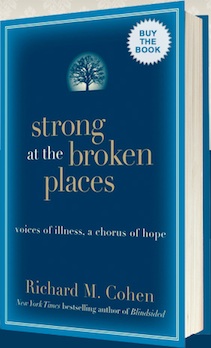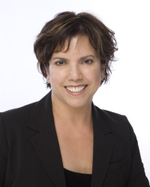 I love this man. Richard Cohen. I love him. His mantra is mine. His hope I cling to. He inspires me.
I love this man. Richard Cohen. I love him. His mantra is mine. His hope I cling to. He inspires me.
He tells the story of coping with his multiple sclerosis and colon cancer in his New York Times bestseller, “Blindsided: Lifting a Life Above Illness.” Awhile back, he came out with a fascinating book, “Strong at the Broken Places: Voices of Illness, a Chorus of Hope,” profiling five brave persons battling illness. Writes Richard, “These are the faces of illness in America. Do not look away. The characters may surprise you, even shatter a stereotype or two. They are people, not cases, survivors, not victims. Quite simply, they are us. they carry shared resolve, a determination to survive. To flourish.”
I read parts of the book two years ago. I was especially intrigued and awed by Larry Frick’s story. Diagnosed in 1984 with bipolar disorder, he spent much of the mid 80s in and out of mental hospitals. Now he’s a mental health professional (that’s an understatement … he spoke at a White House conference where the first surgeon general’s report on mental health was released). I will have the honor of meeting Larry in person in a few weeks, which is why I pulled out the book again. Upon reading it, I knew that I had to share it with you all. Below I excerpt from Richard’s preface.
We, the injured, are everywhere. We are fast becoming a nation of the sick. The numbers do not lie. Chronic illness has become the silent flood, flowing slowly, steadily under our doors. We tumble in slow-motion from safe ground, twisting and struggling to survive in a cold sea of all that we once were and can be no more.
Chronic conditions attack body and spirit, assaulting the quality of our lives. Some are life-threatening. All are life-altering. Ever so slowly, moment by moment, function and sensation cease. Muscles and nerves malfunction. The body’s processes grow difficult. Our view of ourselves as normal human beings making our way in a neutral world is challenged as, in the eyes of others, we become our illnesses.
Chronic conditions do not resolve themselves. Unlike terminal illnesses, there is no high drama with these diseases. They are not sexy, and are little noticed or understood by an unknowing public that would prefer not to think about them. Those who are hit hard know the frustration of being marginalized, reduced, and pushed to the side by these chilly attitudes. We are handed a cocktail of condescension and a basket of doubts about our limitations. The crisis of confidence that follows can be contagious and soon affects every part of our being.
With chronic illness, every facet of a once-robust life is overtaken and redefined. From the ability to find and hold jobs to the capacity to build and sustain personal relationships, the facts of a sick person’s world change dramatically. The slow slide down carries us, and we lose control.
Still, we go on. We double the effort, for what is the option? Too often, we remain silent. We are a hidden population, invisible except to ourselves and those who love us. When I wrote Blindsided, I felt alienated and isolated. I now know I am not alone. Many travel the same road, and common ground lies beneath our feet.
We have so much at stake and so much to say, but it can take years of battle with our own demons to recognize the power of what we have to offer each other. Nobody will speak for us with the authority we bring to our own stories. Where so many among us find the resolve and the inner strength to rise up and keep going is a mystery to me. That we do serves as pure inspiration…
Hemingway had it right. If the world is not the enemy, neither is it our friend. In the end, no matter who surrounds us, we travel alone. Our friends and loved ones are there, providing an infrastructure of love and support. But courage must be drawn from within. Let the world see us as we see ourselves and have the faith to permit us do it our way.
* Click here to subscribe to Beyond Blue and click here to follow Therese on Twitter and click here to join Group Beyond Blue, a depression support group. Now stop clicking.

